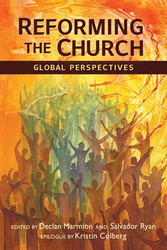2022 Catholic Media Association first place award in gender issues - inclusion in the church
Regarding the question of office in the Christian churches, this volume illuminates with heightened ecumenical sensitivity the arguments for the participation of women in all church offices and ministries, without which there will be no way to the visible unity of the churches. It documents the ecumenical congress that took place in Osnabrück in December 2017 and the “Osnabrück theses”—meant to serve the future international and ecumenical conversation and further discussion about the questions of women in church offices—passed by the congress.
The editors hope that this publication will help to set into motion a debate about ministries and services in the Church, which has been stagnant for a long time, and that it will become clear that these questions can only be answered together—by men and women—from now on.
Product Preview
| Format: | Paperback book |
|---|---|
| Product code: | LP8513 |
| Dimensions: | 6" x 9" |
| Length: | 256 pages |
| Publisher: |
Liturgical Press
|
| ISBN: | 9780814685136 |
| 1-2 copies | $30.75 each |
|---|---|
| 3-9 copies | $29.35 each |
| 10-49 copies | $27.96 each |
| 50-99 copies | $27.26 each |
| 100+ copies | $26.21 each |
Praise
Women in Church Ministries provides scientific evidence that there is a very old tradition of women’s participation in different church ministries and offices. This is an extremely important book because it gives back the debate on the role of women in the Church to theological arguments in an ecumenical and global framework and with a pastoral perspective. It is both possible and urgent to talk about women in church ministries theologically, without resorting to arguments of cultural politics.
Women in Church Ministries systematically dismantles the arguments—theological and otherwise—used to justify the exclusion of women from ordination in the Catholic Church. This is an excellent resource for those committed to the women’s diaconate and for those interested in carving out a larger place for women in the Catholic Church. These pages invite conversation partners as they explore alternative pathways forward for women and provide inspiring examples of women who redefine the boundaries of their role within the Church.
“What’s behind the door?’ This brilliant and multi-faceted discussion of women in church ministry is a must-read as we continue to walk the path toward visible Christian unity. Anyone interested in the potential of women for church leadership, both lay and ordained, will find in this volume a wide array of stimulating insights and questions. This courageous and scholarly collection of essays will challenge its readers to look beyond the answers of yesteryear to discover new and vital perspectives.
For decades, women, more than half the global Christian community, have asked repeatedly to participate in, contribute to, and function at all levels of ecclesial membership, consultation, decision-making, leadership, and ministry. Most poignantly these arguments have been grounded in a theology of baptism. The astute, incisive, and accessible essays gathered here extend, deepen, and sharpen that argument. These historians, theologians, scholars, and pastoral ministers insist on ‘true equality between all with regard to the dignity and to the activity which is common to all the faithful in the building up of the Body of Christ’ (LG 32).
Women in Church Ministries: Reform Movements in Ecumenism offers renewed hope to the enduring question of women's sacramental equality, too often stifled behind ‘closed doors.’ Through skillful ecumenical analysis, this collection not only affirms women as protagonists of Christianity but demands ecclesiological innovation to realize the fullness of women's ministries. This collection boldly models the dialogue a living Church so desperately needs to free itself from harmful paradigms to more deeply embody our baptismal equality.
The presentations of the Osnabrück Congress reveal that even within their own denominations women are having different experiences of their roles in the church. Sharing those experiences in the light of a theologically critiqued tradition, may be just the common ground necessary for a further visible and dynamic Christian unity. This book is an important resource for continuing the momentum on the historical development of ecclesiastical ministries by making them open to all.
Women in Church Ministries gives the history of the discussion, puts it in context, and makes a good contribution to knowledge.
These are brave contributions. It is hoped that they will be heard by the Roman Catholic hierarchy.
Author
Margit Eckholt is professor of dogmatics (with fundamental theology) at the Institute of Catholic Theology, University of Osnabrück.
Dorothea Sattler is professor of ecumenical theology and dogmatics at the Faculty of Catholic Theology, University of Münster.
Ulrike Link-Wieczorek is professor of systematic theology and religious education at the Institute of Protestant Theology and Religious Education, University of Oldenburg.
Andrea Strübind is professor of church history and historical theology at the Institute of Protestant Theology and Religious Education, University of Oldenburg.









